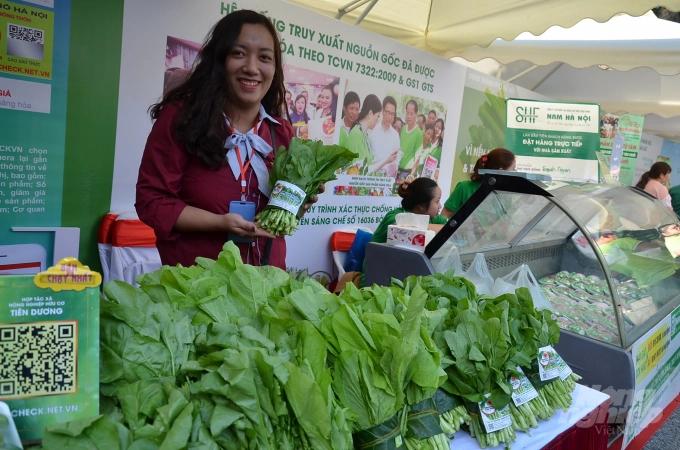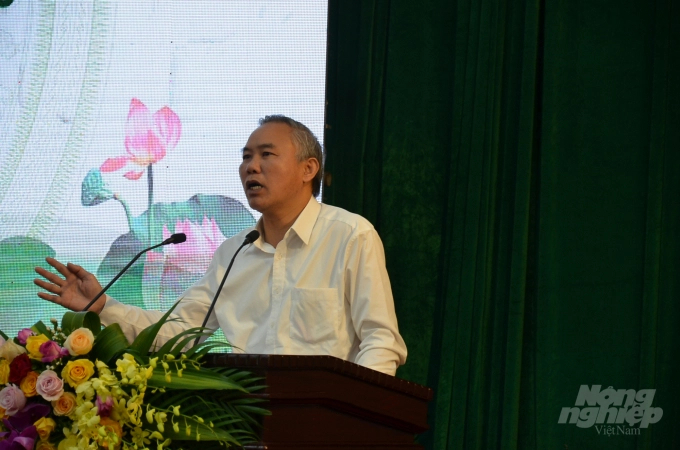November 25, 2025 | 10:12 GMT +7
November 25, 2025 | 10:12 GMT +7
Hotline: 0913.378.918
November 25, 2025 | 10:12 GMT +7
Hotline: 0913.378.918

Safe vegetable - a product of a safe food supply chain is sold in Hà Nội. Photo: NNVN.
Hanoi effectively co-operated with other localities nationwide to develop safe food supply chains in the last five years, an official said at a meeting about the implementation of the project on the supply chains.
The project was launched five years ago by the Agriculture and Rural Development Ministry in three major cities of Hanoi, Da Nang and Ho Chi Minh City as an effort to curb unsafe food.
Director of the Department for Agricultural and Seafood Products Quality Management Nguyen Nhu Tiep said that Ha Noi also did a good job when applying hi technologies in food management, for examples smart codes to trace food origin.
So far, 21 localities or one-third of Vietnam’s provinces/cities supplied safe food for Hanoi but the number of safe food supply chains to the city accounted for half of the total number in the whole country.
In Hanoi, the number of chains increased from 29 in 2015 to 141 this year. In Son La, the number of chains increased from 28 in 2015 to 144 this year. In Ha Nam, the number increased from 13 to 21 in the last five years.
The amount of food included in the safe supply chains increased from 580 tonnes in 2015 to 2,250 tonnes in 2019.
Currently, additional 200 food suppliers in localities have their products available in major distribution channels in Hanoi, for examples, Vinmart with 19,000 tonnes of food worth VND240 billion, BigC Thang Long with 4,600 tones of foods worth VND89 billion and Saigon Co.op Hanoi with 1,800 tonnes of food worth VND37 billion.

Deputy Minister of Agriculture and Rural Development Phung Duc Tien addresses a meeting on the implementation of the project on safe food supply chains in Hanoi.
Tiep said that besides achievements, there remained shortcomings including the modest amount of food that is supplied through the chains, limitations in logistics and storages.
Moreover, 21 localities with the safe food supply chains were only in the northern region while Hanoi consumed food from all localities in the country, he said.
Deputy Minister of Agriculture and Rural Phung Duc Tien applauded the expansion of safe food supply chains among Hanoi and other localities.
He expected the chains would be developed further in both size and quality.
“It’s impossible to test all food so, it’s important to identify risks to prevent unsafe food at early stages”, he said, adding that Hanoi and localities to tighten control over input farming materials, production and distribution.
Vice-chairman of Hanoi People’s Committee Nguyen Van Suu said that the agriculture ministry should offer more direction, co-ordination and support to localities in regional production planning, technology transfer and applications.
He also called for improved linkages in food production, processing and consumption.
Author: Nguyen Thi Tham. Translated by Hien Anh. Edited by Dức Huy.

(VAN) The information was shared at the seminar 'Urban Agriculture - Solutions for Developing Green Spaces,' organized by the Kinh te & Do thi Newspaper and the Biotechnology Center of Ho Chi Minh City.
/2025/11/19/4141-2-132831_216.jpg)
(VAN) One of Japfa's outstanding solutions is implementing digital transformation and artificial intelligence (AI) to optimize operations, enhance productivity, and advance sustainable development.
/2025/11/19/4847-1-093540_448.jpg)
(VAN) The Gia Lai Provincial People’s Committee had a working session with the delegation of the U.S. Department of Agriculture, the State of Idaho, and representatives of the State's leading enterprises.

(VAN) Ca Mau has a sufficient foundation to become a strong regional aquaculture center, where production integrates the economy, the environment, and the lives of the people.

(VAN) SEIKI Group envisions itself as a pioneer in the ‘dual transformation’ of digital technology and green industry, standing alongside the Government and Vietnamese businesses in their pursuit of sustainable development.

(VAN) The VNGEONET network affirms Viet Nam's progress in mastering digital space, providing a precise positioning data platform to serve socioeconomic development.
/2025/11/14/3247-1-184556_35.jpg)
(VAN) Thai Nguyen is methodically implementing digital transformation in the livestock sector, laying the foundation for a modern, transparent, and sustainable agriculture.